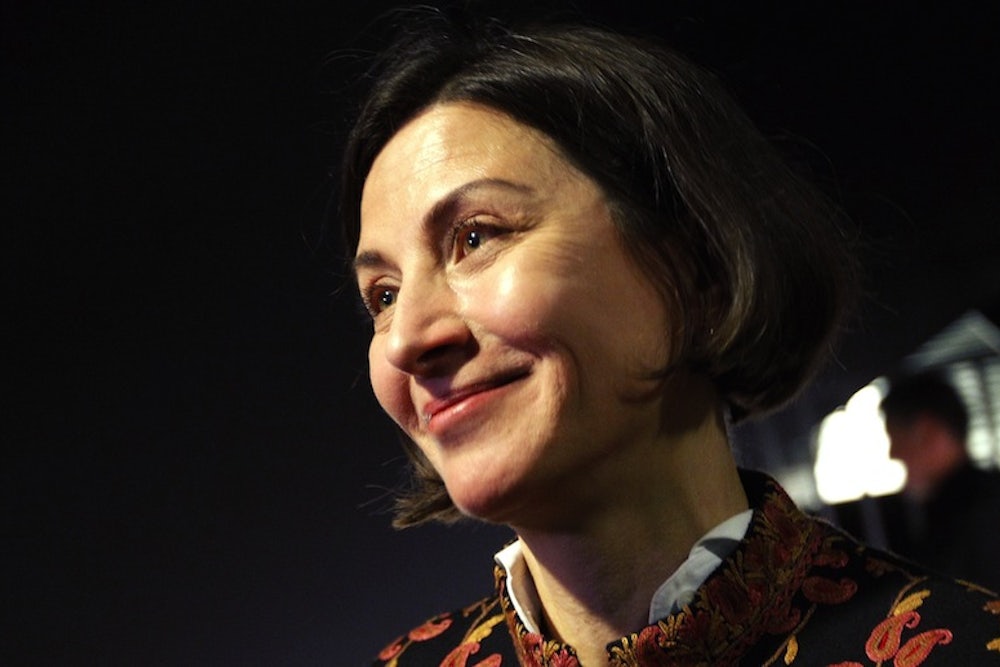Donna Tartt’s most recent novel, The Goldfinch, has achieved commercial success and critical acclaim. But the book has its detractors at well-respected publications, or “the secret rooms behind the first inner sanctum [of the Times],” as Evgenia Peretz puts it in a new piece for Vanity Fair, “It’s Tartt—But Is It Art?” I have not read the novel, but Peretz has little to say about it anyway. The critical divide over the book is in no way unusual or illuminating, but demonstrating its existence is alas the sum total of Peretz’s accomplishment. Like any well-trained glossy journalist, she tries to set out Why This Matters, but she does so in vain. Most, if not all, ambitious and popular books—Jeffrey Eugenides’ Middlesex (Pulitzer) and The Marriage Plot, Denis Johnson’s Tree of Smoke (National Book Award), and Jonathan Franzen’s The Corrections and Freedom—get a few rough reviews, often in prominent venues. Life goes on. Peretz writes that The Goldfinch’s “naysayers believe that nothing less is at stake than the future of reading itself.” The piece does not convince me that the “naysayers” actually believe that, and I’m willing to bet they don’t. If they do, Peretz ought to be pointing out that they’re being silly.
What makes Peretz’s article worth discussing is its near-perfect embodiment of a widespread and pernicious attitude: She consistently treats other people’s views as self-evidently the product of bad faith. In the world that Peretz describes, almost no one holds an opinion that is not motivated by personal animus, posturing, or some other crucial taint. Peretz’s sources share some blame, as some of them indulge in the practice of impugning the motives of their opponents. But choosing what quotes to include is part of journalism, and Peretz is ultimately responsible for framing the debate the way she wanted.
Peretz lays out an apt parallel between the response to The Goldfinch and to Tom Wolfe’s 1998 blockbuster novel A Man in Full (undermining her own claim that The Goldfinch’s reception marks a watershed moment for literature, but never mind). Norman Mailer, John Updike, and John Irving saw Wolfe’s novel, Peretz writes, as “a call to arms” because it needed to be excluded from “the canon” and relegated safely to “airport-bookstore shelves.” Mailer and Wolfe “had history,” Peretz notes, implying that this grudge must account for Mailer’s opinion of the book, in concert with his selfish desire to fight off a rival. Peretz could have judged Mailer’s view on the merits since he elaborated on it at length in The New York Review of Books, but instead she plucks a mean quote from that review to make Mailer sound merely pissy. (The question of whether or not Mailer had a worthwhile case gets no consideration.) Peretz then finds her ideal remark from Wolfe himself, who said that A Man in Full “panicked [Irving] the same way it frightened John Updike and Norman. Frightened them. Panicked them.” Wolfe’s gambit here—they’re just threatened—apparently gives Peretz license to pursue the same approach.
The depiction of literary judgment as mere childish jousting extends to Stephen King and James Patterson, whom Peretz portrays as intemperate and covetous. Authors such as King have “a lifelong gripe” because for them “it’s not enough to sell millions of books; they want respectability too.” Celebration of King’s work sent Harold Bloom “into a tizzy,” Peretz writes, such that he expressed a critical view. As “the most finicky of finicky literary critics,” Harold gets in a bad mood sometimes.
Jennifer Weiner is recruited to defend The Goldfinch. But not because she likes it—she doesn’t speak to that (or Peretz doesn’t let her). Weiner theorizes that James Wood’s negative review may have been motivated by the “tepid” reception for his wife’s most recent novel. This is a serious charge, and it is baseless and repugnant, but Peretz is willing to give it a hearing. For Wood, no reply to this absurd accusation is really available—any response would meet with See, you’re getting angry, one suspects, since Peretz has already demonstrated she won’t take his arguments at face value.
Peretz positions several Goldfinch dissenters—Lorin Stein, the editor of the Paris Review, along with Wood and Francine Prose—as elitist gatekeepers acting on a vested interest in keeping out commoners such as Tartt. The literary royalty are alarmed by an uprising—that’s why they have the temerity to dislike a novel. Stein helps out Peretz with a regrettable comment expressing a worry that readers of the book will “tell themselves they like it.” It is a condescending remark, and Peretz doesn’t miss the chance to make him look bad.
Peretz suggests throughout that it is somehow rude to object to a book that is popular: “Indeed, we might ask the snobs, What’s the big deal? Can’t we all just agree that it’s great she spent all this time writing a big enjoyable book and move on? No, we cannot, say the stalwarts.”
Peretz ends her piece by stating that the question of whether or not criticisms of Tartt are astute will be decided by future readers: The book will last or it won’t. This is a fair point but a banal closing gesture, and it sits awkwardly alongside the rest of the article. Suddenly she is emphasizing that the true guide to literary merit needs decades to reveal itself. Combine this notion with her indifference to discussing the value of the book itself and we are left with the implication that what anyone says now about The Goldfinch does not actually matter at all. This undermines both her piece and everyone she’s quoted. Just kick the Goldfinch can down the road and see what happens. Or we could read it and engage with its actual contents, but for Peretz there’s not much point in that.
